SIXTH FORM HANDBOOK



The Sixth Form is the pinnacle of your time at Hampton and these final two years are incredibly exciting and rewarding as you prepare for life at university and beyond.

Academically, you’ll find that the post-GCSE programme is quite different from what you’ve experienced before. In the Sixth Form, you choose just four subjects that you genuinely enjoy and are committed to. You’ll have more lessons in each subject per week, smaller class sizes, and a different relationship with your teachers.
However, the key to academic success remains the same; establishing regular study routines and putting in consistent effort over the two-year A Level course. Our goal is to help you achieve your academic ambitions, develop independent study habits and take ownership of your learning and outcomes.
Beyond the classroom, we expect you to become leaders and role models in the School. Look for opportunities to develop these skills, for example taking the initiative to start a club, mentoring younger pupils, or helping out with sports coaching.
You can also take part in a three-day residential leadership course in May of the Lower Sixth. It’s also crucial to stay committed to the co-curricular life of the School. The opportunities are endless, and it’s your responsibility to make the most of everything the Sixth Form has to offer.
As a Sixth Former you will enjoy certain privileges. You’ll have access to the Sixth Form Study Centre and the Sixth Form Common Room. During lunchtimes you can go off-site. Plus, you’ll wear a business suit rather than school uniform. With these privileges come responsibilities. We hope you will embrace these opportunities by working hard, behaving respectfully, and maintaining a mature attitude.
We encourage independence, maturity, respect for others, and good study habits. Remember, younger pupils look up to you as senior role models, so it’s important to uphold exemplary standards of behaviour, appearance and work ethic at all times.
There is a lot of information in this booklet as it is designed to be a reference document, both for you and your parents. If you need any further detail or require clarification on any area please do not hesitate to get in touch, we are here to help you! Additional information is also available in the various School policies which you will find on the School website.
We wish you every success in your Sixth Form studies and hope you enjoy your Sixth Form years!
In the Lower Sixth, all pupils study four subjects, and most continue with three of these in the Upper Sixth. Boys usually have seven lessons per week, per subject, increasing to around nine lessons per week, per subject, in the Upper Sixth.
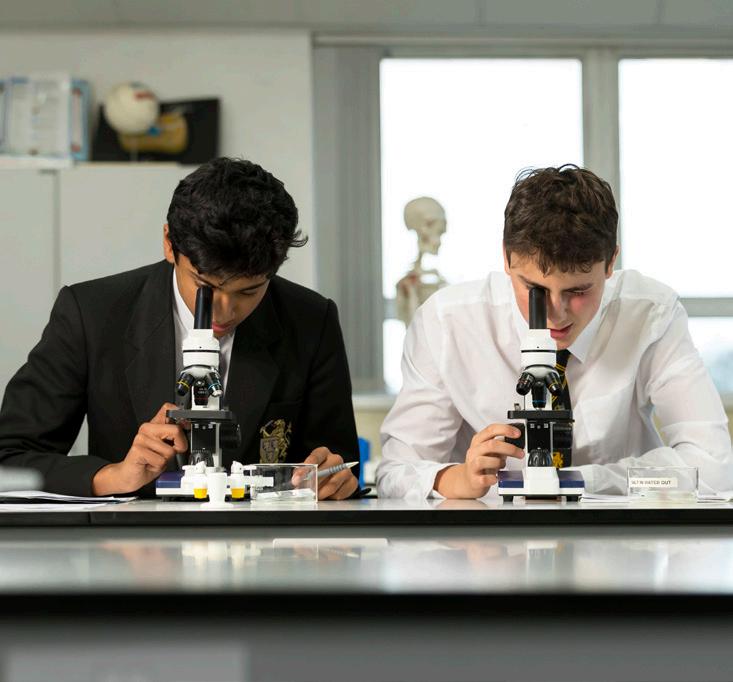

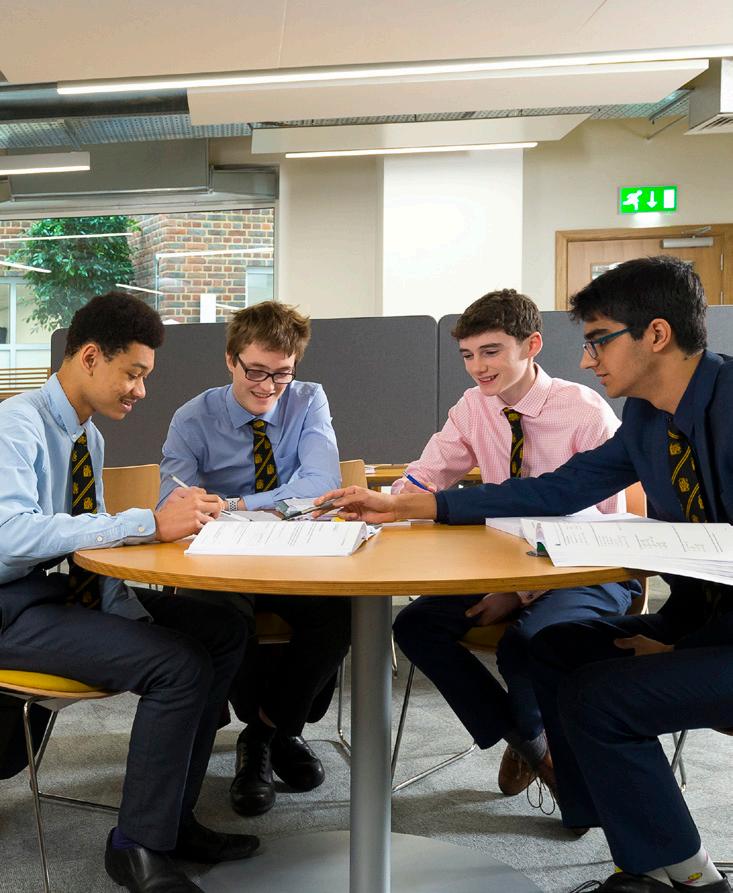
There is no fixed homework timetable in the Sixth Form. Each subject sets homework, but there is more flexibility in terms of the amount and type of work assigned. For example, in subjects such as Maths and Modern Languages, you can expect regular but shorter homework. In subjects such as English and History, you may receive longer essays that need to be completed within a week, as reading is also expected before writing the essay.
A Levels require hard work, so be prepared to put in effort throughout the Sixth Form. It is recommended you spend 2-3 hours on homework every night (you can use study periods to help with this) and also dedicate a significant amount of time on weekends. If you fall behind in your studies it is difficult to catch up, so it’s important to develop good working habits early on. Don’t wait until the last minute to study for exams; those who perform well at A Level, are those who consistently work hard across all their subjects. Your academic progress will be monitored via grade cards.
It’s worth noting that the UCAS process, which universities use to make offers, starts in February of the Lower Sixth. The grades you achieve during this time will be used to inform the UCAS grades issued by your subject teachers, so it is important that you take your Lower Sixth studies seriously.
To bridge the gap between GCSE and A Level, you’ll need to spend time consolidating what you learn in class. There’s a lot to learn and simply attending lessons is not enough to remember everything. It’s a good habit to read the chapter(s) of your textbooks which are relevant to the work covered in lessons and supplement your notes. Ideally, try to read about the upcoming topic before the lesson. Your teachers and the librarians can offer additional reading recommendations.
Instead of exercise books, most subjects use paper or digital platforms such as OneNote. You may choose to write notes on paper or in text files, but you may be expected to submit your work using the class OneNote notebook, VLE (Virtual Learning Environment) or Cloud Design Box platforms.
You will have allocated study periods, which can be used for various activities including music lessons or music practice; working in the Study Centre, Library or Atrium tables; or simply enjoying free time in the Sixth Form Common Room. If you have any minor work-related issues, you will be able to get help during subject clinics at lunchtimes or after School. More serious problems, such as missing, incomplete or unsatisfactory homework may result in a Sixth Form detention.
In the Lower Sixth, you’ll be assigned to a new Tutor Group of around 10-13 pupils based on shared interests. New pupils joining the Sixth Form will be integrated into these Tutor Groups.
In September, all Lower Sixth pupils attend a morning induction session before the start of the autumn term. During this time, you will meet with the Head of Year, Form Tutors and the Heads of Department for your chosen subjects.
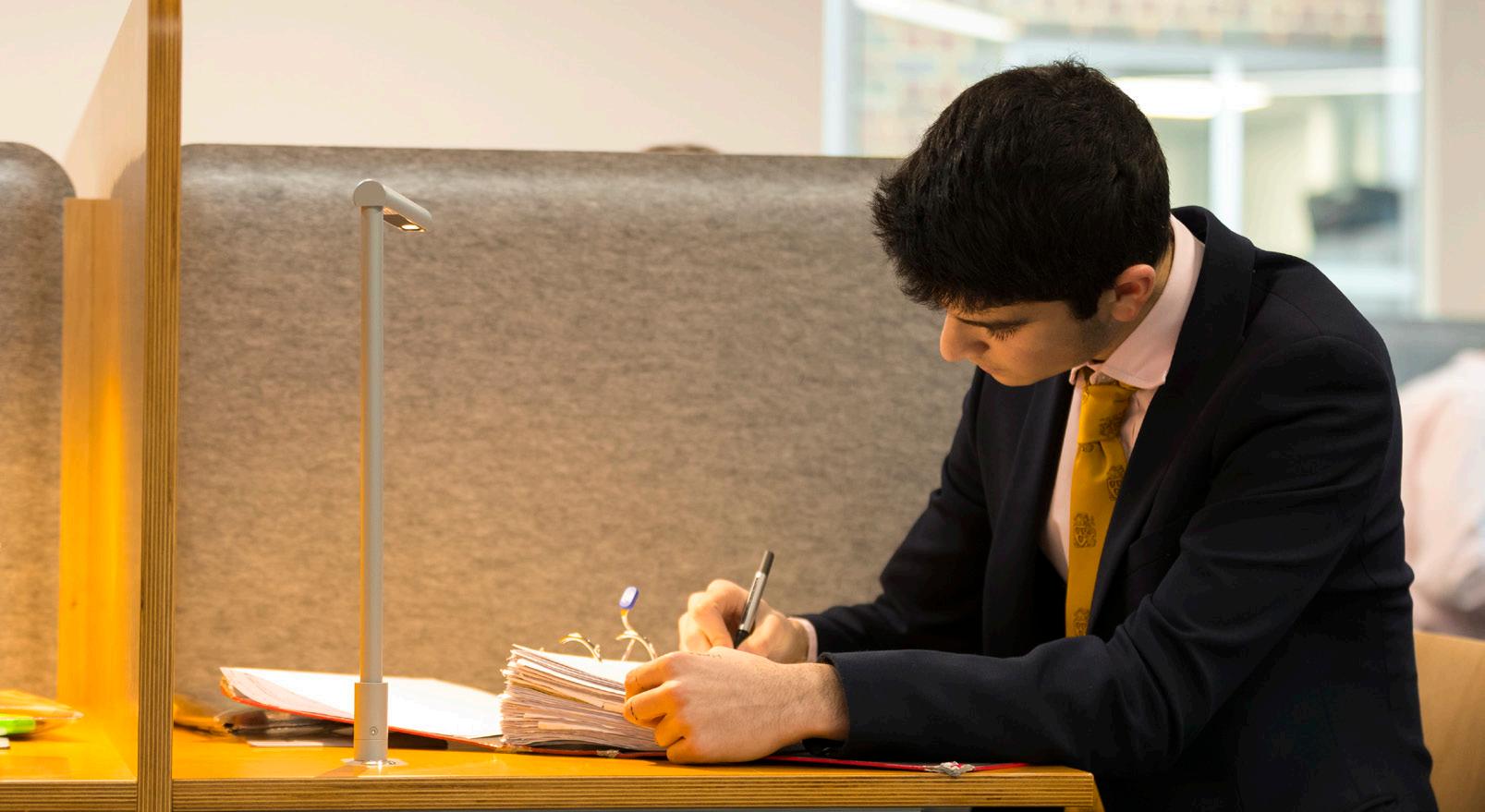
There will be a Parents’ Pastoral Forum in September for Lower Sixth parents to meet their son’s new Form Tutor. A formal Parents’ Evening, involving meetings with subject teachers, is held in the first half of the spring term.
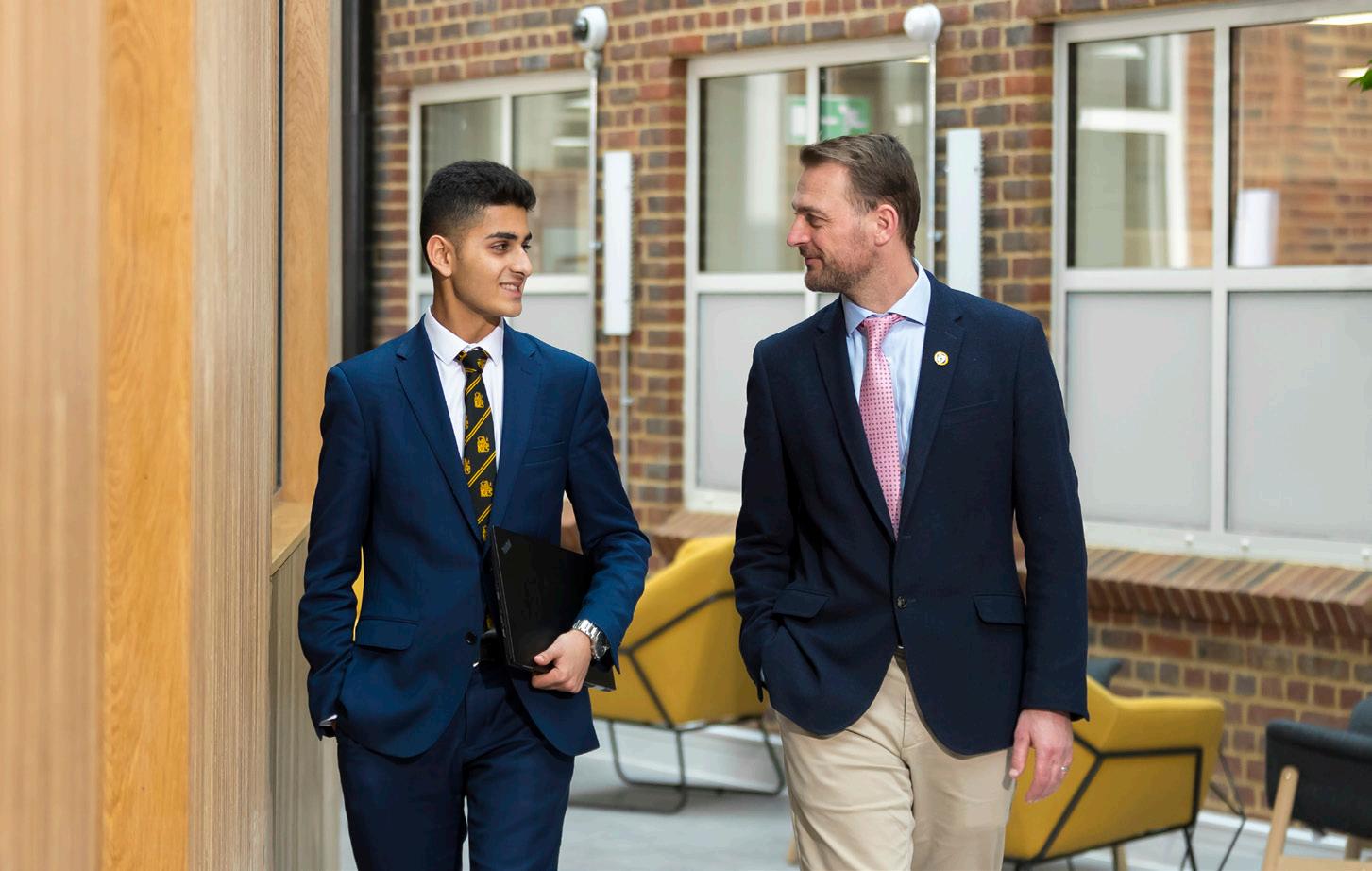
Your Form Tutor is responsible for your day-to-day wellbeing, academic progress and behaviour. They should be your first point of contact for support, advice and encouragement. They will also keep your parents updated on your progress.
Your Form Tutor will support your overall welfare, encourage you to get involved in co-curricular activities and foster positive social interactions. They are also responsible for writing your UCAS reference.
If you ever have any questions or concerns you should speak to your Form Tutor first – they are there to help you. There are also three School counsellors who you can contact confidentially during the week at counselling@hamptonschool.org.uk.
For health-related issues, you can talk to one of the School Nurses. The Nurses have contact details for local services that can give advice on a wide range of topics. The School Nurses can be contacted on nurse@hamptonschool.org.uk
It’s important that Sixth Formers act as role models for younger pupils in terms of their dress and appearance. The School Code outlines the dress and appearance guidelines specifically for the Sixth Form, which includes the following standards:

• You are required to wear dark business suit, with a formal shirt (no ‘lumberjack’style checked shirts) and the Sixth Form tie. Jackets should always be worn around School.
• Pullovers should be plain, sober-coloured and either V- necked or have a “quarter zip”. No logos are allowed. Sweatshirts, hoodies or sports tops are not allowed during the School day.
• Black or brown formal shoes and dark socks should be worn. Trainers or branded footwear, including black ones, and white/coloured socks are not allowed.
• On Wednesdays, the day of your timetabled sports afternoon, you should wear Hampton sports kit to School. If you cannot follow this requirement you will be asked to wear your business suit and change before sport
• Your hair should be in an appropriate style for a smart, business-like environment. It should be clean, brushed and not dyed. Long hair should be tied up and kept off the face at all times.
• Jewellery and facial hair are not permitted (unless authorised for religious, cultural or medical purposes). If you have concerns about this, please speak to your Head of Year. The School strongly advises against
the wearing of tattoos but, if you have one and you are of legal age, it must be concealed during all School activities.
• Please note that if your dress is consistently deemed unacceptable by the Head of Year, you may be asked to return home and change and receive a sanction.
The Sixth Form tie and School sports kit are available from AllyCatz Ltd in Hersham. The store is open Monday-Saturday from 9.00am-5.00pm and appointments are
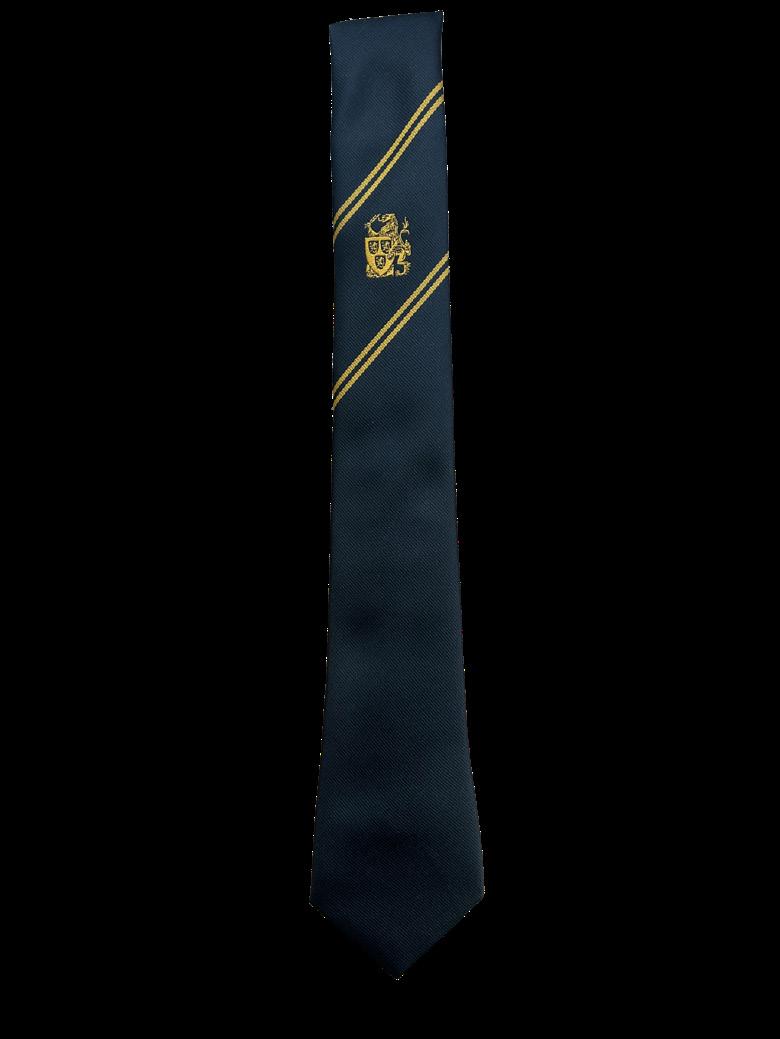
All Hamptonians are expected to arrive in good time for registrations, lessons, and other School commitments. If you miss morning registration but arrive before 9.00am, you must sign the late list in the Reception area. If you arrive after 9.30am, register with Reception.

Morning registration finishes at 8.50am, so you should be in School no later than 8.40am. This will give you time to prepare for the day, hand in work, and start the day calmly. It’s also the time when Form Tutors give out messages and chat with their Form. Attending all timetabled lessons, including Curriculum Enrichment, Assembly and both Form Tutor periods is compulsory.
In the Sixth Form, you may leave School after afternoon registration or your last taught lesson, whichever is later. If you do leave, make sure you sign out at Reception. We strongly recommend using study periods sensibly, and not going home in the afternoon without doing any work. The Library and Sixth Form Study Centre are open until 5.30pm every day for you to study.
If you feel unwell during the School day, always visit the School Nurse for advice. It’s important that you don’t sign yourself out of School and go home.
If you have a dental or medical appointment during School hours, it’s important to let the School know in advance. You can do this by completing the planned absence request form on My School Portal. Don’t forget to sign out with School Reception when you leave and sign back in when you return. If you’re absent unexpectedly, for example due to illness, make sure your parents and guardians call the School Office or fill out the absence reporting form on My School Portal. They should do this on the day of your absence and for any subsequent day(s) until you are back.
School holidays are generous and published at least 12 months in advance. We expect family holidays to take place within these dates. Requests for absence, other than for medical reasons, should be made in writing or via email to the Head of Year as soon as you know about the need for absence. It’s best to do this well in advance.
During the School day, you’re not allowed to leave the premises, except to visit Sainsbury’s near Tangley Park. If you have no lessons or commitments during period 5, you can visit after 12.00pm. Otherwise, you can go after 12.35pm. Remember you must be back in School on time for afternoon registration or any other lunchtime commitments. When leaving School, make sure you sign out at Reception, we strongly advise going in pairs or small groups.
As part of the School’s aim to provide a broad and balanced education, all Sixth Form pupils have two periods of Curriculum Enrichment a week. This is an opportunity for you to broaden your horizons and expand your mind. You’ll cover various topics which we believe an intelligent, articulate and free-thinking individual should have an opinion on. These sessions will help develop vital skills for your time at university and beyond.
Curriculum Enrichment runs across both years of the Sixth Form and is run in conjunction with LEH. It consists of core sessions and optional sessions that you can choose from. In the Lower Sixth, there are four 5-week sessions, and in the Upper Sixth, there are three. Additionally, we invite interesting external speakers to talk about a range of topics, including personal health, politics and contemporary ethical concerns. Core sessions include Thinking Skills, Community Service and Oracy Optional Sessions provide you with the opportunity to explore your interests in a wide range of courses such as Current Affairs, Cookery, First Aid, History of Art and Architecture, Law, Linguistics, and Mindfulness.
A Hampton education should prepare pupils for life and PSHE (Personal, Social, Health Education) plays a pivotal role here. Our spiralled curriculum aims to educate all pupils to think and act for themselves, equipped with appropriate knowledge and an understanding of the wider world. The programme also aims to foster a set of personal qualities and values that will help pupils thrive throughout their time at Hampton, and meet the demands of adult life.
In the Sixth Form, the focus is very much on Life Beyond Hampton with a range of sessions from the following strands of the curriculum: Health & Wellbeing, Relationships & Sex Education, Living in the Wider World and Digital Wellbeing. All sessions are designed to be discursive in nature as well as stretch and challenge. There is also a significant focus on Careers and, of course, the UCAS process. PSHE is delivered by a combination of your Form Tutors, in Thursday Period 3, as well as a wide range of external speakers who are specialists in their fields. The PSHE department are also involved in the delivery of the subject, as are the Senior Leadership Team (SLT). Pupil-led sessions are increasingly central to our provision here and there will be plenty of opportunities for Sixth Formers to deliver sessions to younger pupils during the academic year.
Finally, the PSHE department works closely with all pupils to ensure the provision is meeting the needs of Hamptonians. Termly feedback is gathered and new lessons are created directly from pupil requests. Pupils are very much encouraged to get in touch with Mrs V C Halford (Head of PSHE) or Mr R T Scarratt (Assistant Head – Pupils & Communications) should they want to discuss any aspect of PSHE.

Sixth Form pupils can be awarded a blue Academic Tie or a yellow Service Tie. If you excel in a particular subject, or demonstrate an outstanding approach to academic life, a Head of Department or Head of Year may nominate you for an Academic Tie. These ties are presented by the Headmaster.

In the Upper Sixth, senior pupils who have made a significant contribution to the wider life of the School can be awarded a Service Tie. These ties are not given out just for participation, but are earned by those who have shown leadership, exceptional skill or a high degree of commitment in a specific area of the co-curricular life of the School.
Volunteering is a fantastic way to make a positive impact on both our School community and the wider community. In the Sixth Form, we believe in setting an example by dedicating our time, energy and talents to others. There are many opportunities for you to get involved and make a difference. For example helping out at School events such as visitors’ events and pastoral forums.
You can also share your expertise in different subjects by helping younger pupils at other schools, or helping senior citizens use technology – empowering someone with digital skills can have a very positive impact on their life.
In the Sixth Form, to recognise your achievements and efforts, we award ‘Panini points’. Members of staff can award these points to you for outstanding academic performance, exceptional effort on a particular piece of work, or for your valuable service to the School. Once you’ve collected 10 Panini points, you can exchange your completed Panini card with your Head of Year or Assistant Head of Year for a Panini voucher, entitling you to a delicious free panini from the Sixth Form Common Room.
On the other hand, if you miss, have incomplete, or unsatisfactory homework, there can be consequences such as a Sixth Form detention. The Sixth Form detention takes place on Tuesdays and Thursdays in the silent area of the Sixth Form Study Centre from 4.00pm to 5.00pm. A detention may also be given for behavioural reasons.
For more serious behavioural issues, a Friday Head of Year detention, or a Saturday Headmaster’s detention may be given. In such cases, a referral from the Deputy Headmaster, Mr Morris, would be involved. In rare cases of severe breaches of discipline, suspension or required removal from School may be considered.
It’s important to remember that we’re here to support you and help you thrive during your Sixth Form career. These detentions and measures are in place to help you learn from any mistakes, maintain discipline and ensure a safe and respectful environment for everyone. Further details are available in the Rewards and Sanctions Policy.
“Givingback is baked into the school’s DNA.” Good Schools Guide
If you are ready to show your leadership potential and take on responsibility we encourage you to apply for the role of a Prefect or a Mentor. Successful applicants need to have a positive approach to School life, excellent behaviour, attendance and punctuality and be able to effectively manage their studies. Following the School dress code is also a must too!
How to apply: you will be invited to apply for both roles in the first half of the spring term in the Lower Sixth. Applications are made in writing and the successful candidates selected around February half term. Opinions of both staff and other pupils are considered and Prefects and Mentors announced in the summer term. A summary of the roles is provided below:
A Prefect is expected to:
• Carry out duties, including weekly allocated duties, assigned by Heads of Year and other staff.
• Assist with and attend School events such as Open Morning, visitors’ events, pastoral forums and option evenings.
• Help monitor use of the Sixth Form Common Room and Study Centre.
• Uphold the School’s Code of Conduct and promote the School ethos.
• Demonstrate consistent commitment to this year-long role
A Mentor is expected to:
• Be a conspicuous and friendly face in their allocated lower School Form room both before School and at afternoon registration
• Promote the School code in Form rooms and around the School generally
• Take an interest in their Form’s activities and experiences
• Mediate low level disputes, but inform the Form Tutor if there are concerns about relationships within the Form
• Act as a positive role model at all times in attitude and appearance
• Help the Form Tutor deliver the PSHE syllabus during selected sessions

• Assist with team building events, such as Avon Tyrrell, and help out at pastoral forums
• Demonstrate consistent commitment to this year-long role
A comprehensive support programme is in place to guide pupils and parents through the entire university application process and begins in February of the Lower Sixth with an introduction to the UCAS process.
You will also be given access to Unifrog, which enables you to compare different courses and universities, based on important factors such as living costs, assessment options and future job prospects. Unifrog also enables you to navigate the specific requirements for Degree Apprenticeships, entrance assessments and Oxbridge.
Specific advice and support are available to those aiming for Oxbridge, medicine, veterinary science or dentistry, or those considering studying overseas where the application process can be very different.
We organise various events throughout the year to provide you with valuable insights into university life and possible future careers. The annual LEH Higher Education Fair is a chance to talk to representatives from many leading universities and explore different courses. In April, we hold a Higher Education evening, which provides parents with a comprehensive briefing on the entire university process. To further support your career aspirations, we have a dedicated Careers Week in February and a Universities Week in May.
During the summer term of the Lower Sixth, you will have the opportunity to meet with selected staff with your parents, to discuss your university ambitions and seek personalised advice. You can also drop into the UCAS Meeting Room during the first half of every lunchtime to meet with the team, ask for guidance, and discuss any questions or concerns you many have about your UCAS application.
In June we hold a Personal Statement morning during which you can start drafting your personal statement with the support of specialist subject teachers. For those aiming for medical programmes or Oxbridge, the internal deadline for UCAS form submission is early September. We aim to submit all other applications by the end of the autumn term, well before the formal external deadline in January.
Aspirational grades are assigned to all pupils and are challenging but achievable targets to work towards. These grades are tailored to your individual abilities and based on the grades achieved at the end of Sixth Form by previous pupils with similar academic profiles. They give you something to strive for and ensure you’re pushing yourself to reach your full potential.
UCAS grades are part of the UCAS application process and are required for each A Level subject. These grades are determined by subject teachers in consultation with Heads of Department and the results of the internal exams at the end of the Lower Sixth. Your end of year exams are therefore very important.
You will receive a copy of your UCAS grades, which will help you make informed choices about the universities you want to apply to. UCAS grades will always be as positive as possible and should not be confused with a subject teacher’s assessment of a probable final outcome as they may not always be the same.
Visiting universities before applying is an important part of the decision-making process. To strike a balance between taking time off School and university visits, we are happy to authorise two visits during the summer term of the Lower Sixth and two visits during the autumn term of the Upper Sixth. If you’re applying to Oxbridge, you may take an additional day to visit either Oxford or Cambridge.
To make the most of your time and minimise School absences, we recommend researching universities and their respective locations during the summer holidays. This will give you a head start and help you narrow down your choices. Subject-specific open days are often the most helpful but are usually during term time.
Many universities offer a second, offer holders open day. While these can be valuable experiences, we suggest considering whether attending them would be beneficial, as they usually take place during the spring term of the Upper Sixth – a time when it is important to prioritise your lessons in preparation for your upcoming A Levels.
The Sixth Form Common Room is your designated social area and a great space to enjoy some downtime. It is open from 9.00am to 4.00pm and girls from LEH are also welcome to visit, but they must sign in and out. Food is served between 10.30am and 1.45pm at subsidised prices. It’s important that the area is kept clean and tidy, with dirty plates and cutlery put in the trays

provided. Entertainment options include a television and table football and we expect these to be looked after and used sensibly. Damaged equipment may not be replaced and deliberate vandalism will be sanctioned as appropriate.
The Sixth Form Study Centre is a place for quiet academic study and is open from 7.30am to 5.30pm. The second floor is strictly for silent study only, and is where supervised private study and detentions also take place. Inside the pod on the ground floor work can be more collaborative and quiet chatting is fine, provided it doesn’t disturb other users. The area outside the pod on the ground floor is designed for reading
If you want to socialise you should go to the Common Room, or work at the Atrium tables. In the summer term, both floors of the Study Centre become a silent study space to provide more space for exam preparation.
The rules for using both spaces are part of the School Code of Conduct which applies at all times.
Senior sports take place on Wednesday afternoons and we offer a variety of major and specialist sports and leisure and fitness activities, catering for all interests and abilities. Some of these take place at lunchtime and some continue throughout the afternoon.
In the Lower Sixth, attending one of the listed sports activities is compulsory and you are required to be in School until at least 3.00pm. If your activity finishes earlier then you can join another activity or work in the Study Centre. For activities which finish between 3.00pm and 4.00pm, you need to register in the Sixth Form Study Centre before leaving the School premises.
In the Upper Sixth there are also off-site activity options, for example, out of School gym. If you request this option, even for the occasional week, you must ask permission in advance by emailing your Form Tutor and copying in Mr Mills, Director of Sport, and the Head of Year. Provided you have permission you can then sign out at Reception before leaving School.
Information about the sports options available is provided by Mr Mills and boys have a free choice. Once a choice has been made, regular attendance is expected and monitored. If for any reason you’re unable to attend, you must ask permission in advance. If an absence occurs without prior permission, it will be reported to the Head of Year and, if necessary, to the Headmaster.
Rowing Tennis
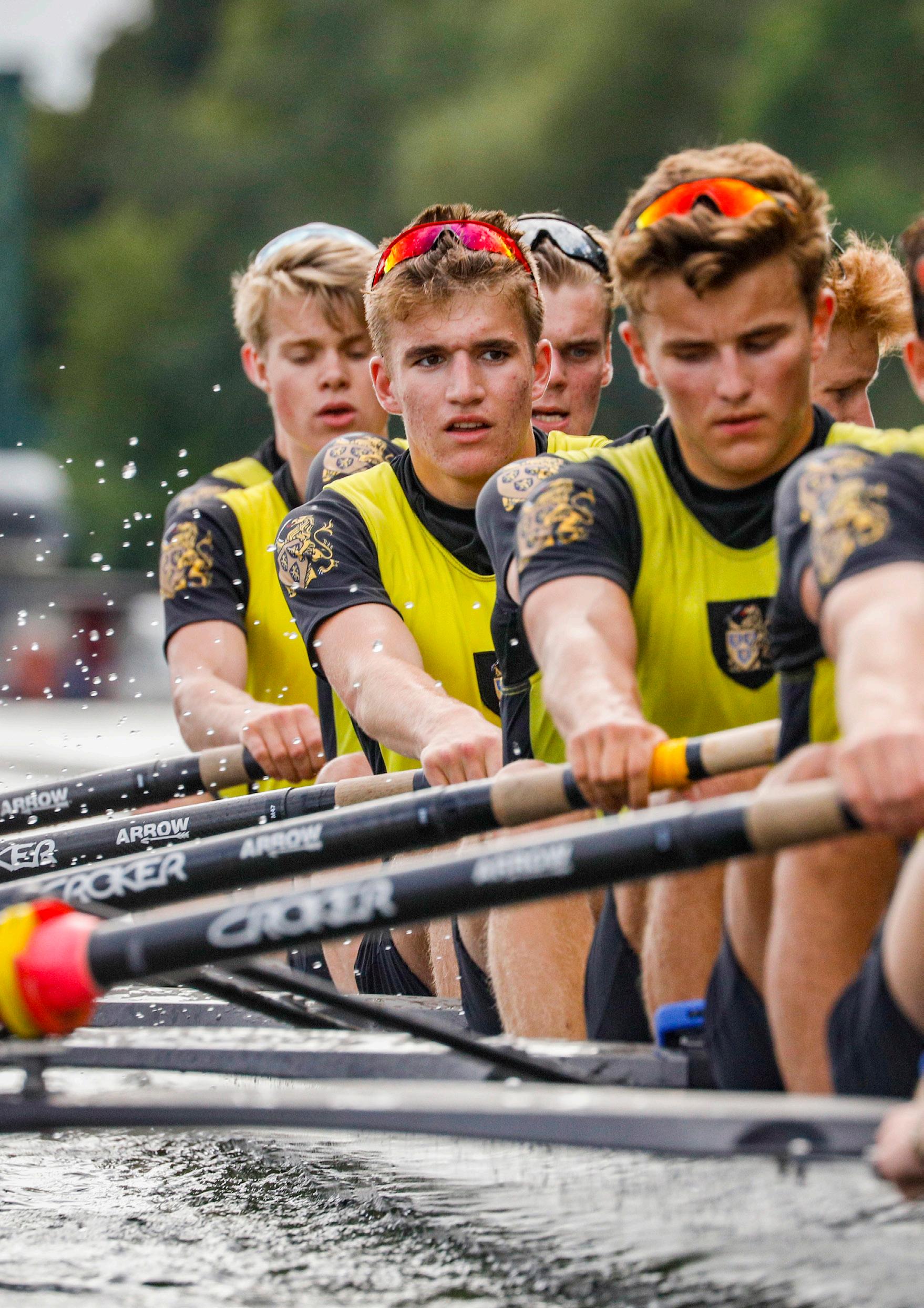
Climbing
Football Teams
Basketball
Badminton
Fitness Suite
Golf (team and lessons)
Fitness/Weight Training
Rugby
Running
Table tennis
Cycling
Squash
Sailing/ Windsurfing
Cricket
Athletics
Yoga
If you plan to drive to School you need to complete a vehicle identification form. This form should be submitted to your Head of Year. There is no on-site parking for Sixth Formers, however, you can park in suitable spaces on the roads around the School. Please ensure you show due consideration for other road users, local residents and public buses. During the School day, cars should not be used unless you have specific permission from the Head of Year.
Please note that you must not under any circumstances give lifts to another pupil in your car or on your motorcycle without the explicit and advance consent of BOTH sets of parents. If you’re planning to give regular lifts, please ask the recipient’s parents to write to the Head of Year. You should also remember that your vehicle cannot be used to carry more passengers than are covered by the insurance policy.
For Wednesday afternoon away fixtures, all members of the team are expected to travel with each other in School vehicles. You cannot drive yourself unless a special exemption is made in agreement with your team’s coach, which must include written communication with your parents.
Driving lessons can by scheduled during School hours, but only if they fall after your last taught lesson in the morning or afternoon. Lessons during lunchtime are fine provided you are back in good time for afternoon registration. Arranging driving lessons during study periods or between classes is not permitted. In cases where the driving lesson falls before afternoon registration, an advance absence note from your Form Tutor is required.
Sixth Formers may miss lessons if their driving test falls on a school day, but must inform their Form Tutor and the relevant subject teachers in advance. Boys may only arrange a driving lesson during the School day if it is after their last taught lesson. If this is before afternoon registration they must bring in an absence note in advance for their Form Tutor.
As many of our in-class resources are now online, you may bring in a laptop of your choice for lessons. There is no specific requirement regarding the type or brand of device but having a keyboard and touchscreen that supports a stylus is useful. It is also worth noting that Hampton is a Microsoft Office school, so while Apple laptops do work, Windows based operating systems integrate more successfully with our software.
The IT department will assist with device set-up and connecting to the School’s wifi and printers. And do their best to help with occasional queries and issues but ongoing support for personal devices is not available. File storage is cloud based, and high processing power is only needed for pupils planning to engage in activities such as video editing. Please feel free to check with our IT department before purchasing a particular device.
While Sixth Formers may use their mobile phones to access the School’s wireless network during break and lunch times, as well as study periods, phones must not be used, at any time, in the Dining Hall, when moving about the School buildings or in the corridors. Failure to observe this rule is likely to result in confiscation of the device and a possible sanction. To access the wireless network using your mobile phone during a lesson, you must have the explicit permission of your subject teacher.
What do I do if I want to change my A level options?
If you would like to change your choice of A Levels after you have received your GCSE results please email Dr Hendry, Deputy Head (Academic) as soon as possible and ideally before the start of term: s.hendry@ hamptonschool.org.uk
Can I change which Tutor Group I am in?
We typically don’t make any changes to Tutor Groups unless there are exceptional circumstances. Everyone has been asked to nominate five friends they would like to be with and we put every effort in to make sure everyone is with at least one of those friends. If we start making changes it can disrupt the entire year group and we want to create a smooth and inclusive transition for all. Part of the excitement of joining the Sixth Form is the opportunity to make new friends and work with a variety of different people. Your Form Tutor will always be sensitive to the needs of all the pupils in their Form.
What options are available for lunch?
The vast majority of Sixth Form pupils have School lunches, served from 12:00pm until 1.45pm in the Main Hall. You only have lunch between 12:00pm and 12:25pm if you are free P5. Hot food is also available in the Sixth Form Common Room and you can choose to go off-site to buy lunch at Sainsbury’s, but do remember to sign out. Lastly some boys bring a packed lunch which they choose to eat in the Main Hall or Sixth Form Common Room with their friends.